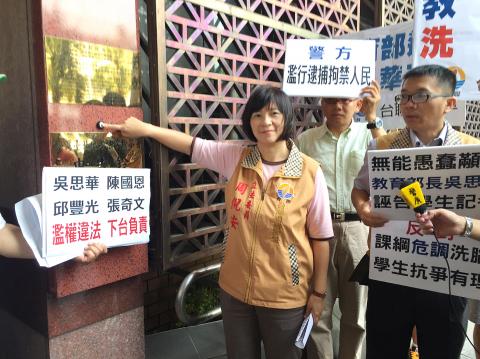President Ma Ying-jeou (馬英九) and Premier Mao Chi-kuo (毛治國) should make public their stances on the controversial “fine-tuning” of high-school curriculum guidelines, Taipei Mayor Ko Wen-je (柯文哲) said yesterday, criticizing what he called the Ma administration’s unwillingness to address the controversy.
“Because the curriculum guidelines have already caused so much controversy, the premier and the president should have made their stances clear long ago,” Ko said.
“The curriculum guidelines are their problem and it is their responsibility to resolve it,” Ko said. “Because the issue has not been properly addressed and the Ministry of Education did not deal with the student protests effectively, things got to the point where the police had to come in and clean up the mess.”

Photo: CNA
The adjustments to curriculum guidelines slated to go into effect on Aug. 1 have been controversial for an allegedly “China-centric” focus and “opaque” approval process.
Student activists and three reporters were arrested on Thursday for trespassing on ministry grounds during a protest against the changes.
Ko yesterday said that any decision on whether police officers would be disciplined for making the arrests would have to wait until the Taipei Police Department presented a full report.
Because of the police department’s vested interests, the report would be subject to a review by a city committee chaired by Taipei Deputy Mayor Teng Chia-chi (鄧家基), with the students and reporters involved invited to submit their views, he said.
Meanwhile, the ministry yesterday reiterated that it would continue to “cooperate” with the police investigation into the incident in accordance with the law.
Deputy Minister of Education Chen Der-hwa (陳德華) said that while the ministry would advise the public prosecutor to show leniency in cases where students were willing to apologize, there were no plans to drop charges.
He added that the students’ physical altercation with a ministry official who tried to prevent them from entering the building was subject to public prosecution.
Chen added that no decision had been made on whether or not to drop charges against the reporters who had been arrested with the students.
Separately yesterday, in a regular meeting at the Presidential Office building attended by Ma, Mao and Cabinet officials, Minister of Education Wu Se-hwa (吳思華) made a presentation on the planned adjustments to the curriculum guidelines, but made no mention of the ministry’s much-criticized handling of the protest.
Wu defended the procedures the ministry had followed in proposing the adjustments as he said that they were in accordance with established precedents.
The 17 debatable items in the new version of the curriculum guidelines were in line with historical facts and the Constitution, Wu added.
In response to demands that the decisionmaking process be made transparent, the ministry has publicized meeting minutes and the conclusions of the curriculum review committee, Wu said, adding that the ministry would stand by its decision not to disclose what each review committee member had said and voted for at the meetings.
Making the information public “could have serious repercussions for the operations of the administration branch” because it would mean that individuals sitting on many other committees commissioned by the ministry or other governmental agencies would also become subject to the requirement, Wu said.

The manufacture of the remaining 28 M1A2T Abrams tanks Taiwan purchased from the US has recently been completed, and they are expected to be delivered within the next one to two months, a source said yesterday. The Ministry of National Defense is arranging cargo ships to transport the tanks to Taiwan as soon as possible, said the source, who is familiar with the matter. The estimated arrival time ranges from late this month to early next month, the source said. The 28 Abrams tanks make up the third and final batch of a total of 108 tanks, valued at about NT$40.5 billion

Travel agencies in Taiwan are working to secure alternative flights for travelers bound for New Zealand for the Lunar New Year holiday, as Air New Zealand workers are set to strike next week. The airline said that it has confirmed that the planned industrial action by its international wide-body cabin crew would go ahead on Thursday and Friday next week. While the Auckland-based carrier pledged to take reasonable measures to mitigate the impact of the workers’ strike, an Air New Zealand flight arriving at Taipei from Auckland on Thursday and another flight departing from Taipei for Auckland on Saturday would have to

A group from the Taiwanese Designers in Australia association yesterday represented Taiwan at the Midsumma Pride March in Melbourne. The march, held in the St. Kilda suburb, is the city’s largest LGBTQIA+ parade and the flagship event of the annual Midsumma Festival. It attracted more than 45,000 spectators who supported the 400 groups and 10,000 marchers that participated this year, the association said. Taiwanese Designers said they organized a team to march for Taiwan this year, joining politicians, government agencies, professionals and community organizations in showing support for LGBTQIA+ people and diverse communities. As the first country in Asia to legalize same-sex

MOTIVES QUESTIONED The PLA considers Xi’s policies toward Taiwan to be driven by personal considerations rather than military assessment, the Epoch Times reports Chinese President Xi Jinping’s (習近平) latest purge of the Chinese People’s Liberation Army (PLA) leadership might have been prompted by the military’s opposition to plans of invading Taiwan, the Epoch Times said. The Chinese military opposes waging war against Taiwan by a large consensus, putting it at odds with Xi’s vision, the Falun Gong-affiliated daily said in a report on Thursday, citing anonymous sources with insight into the PLA’s inner workings. The opposition is not the opinion of a few generals, but a widely shared view among the PLA cadre, the Epoch Times cited them as saying. “Chinese forces know full well that